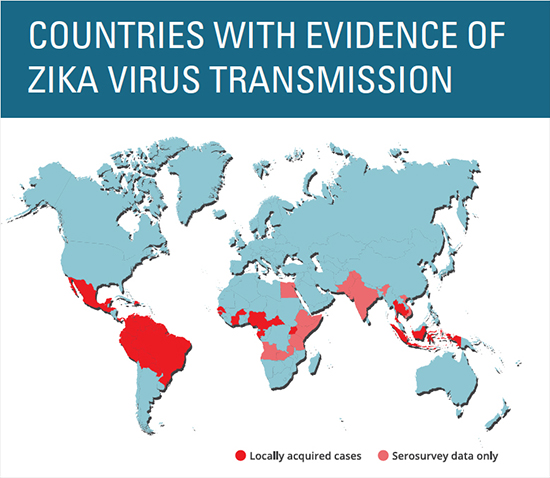Defending against Zika virus

The Zika virus, unlike other mosquito-borne viruses like malaria, has been relatively unstudied—until now.
That is set to change since Zika, now spreading through Latin America and the Caribbean, has been associated with an alarming rise in babies born with abnormally small heads and brain defects—a condition called microcephaly. “This is a huge public health emergency and horrible on many levels,” says Uriel Kitron, chair of Emory’s Department of Environmental Sciences and an expert in vector-borne diseases, which are transmitted by mosquitoes, ticks, or other organisms. “It appears that this virus may pass through a woman’s placenta and impact her unborn child. That’s about as scary as it gets.”
The Zika outbreak, which also has been linked to increases in the nerve disorder Guillan-Barré syndrome, began in Brazil last spring, with an estimated 500,000 to 1.5 million people infected. Symptoms of the virus may include a rash, joint pains, eye inflammation, and fever.
“Zika represents a horrifying illness for women who are pregnant, but for most people, it’s either asymptomatic or mild,” says Professor of Infectious Diseases Phyllis Kozarsky, co-director of Emory’s TravelWell clinic, who says the Aedes mosquito is, unfortunately, a very effective vector. “It’s not like they are just in the swamps, in the rice fields, in the rural areas. These mosquitoes thrive around people.”
Researchers from Emory’s School of Medicine are helping to determine exactly how the Zika virus harms the developing brain. Emory geneticist Peng Jin and colleagues were part of a rapidly assembled team, including scientists from Johns Hopkins and Florida State University, whose research showed the Zika virus can infect neural stem cells critical for brain development. The role of Jin’s lab was to analyze how the patterns of gene activity in neuronal cells were altered by Zika infection.
The Emory Vaccine Center has assembled a team of scientists to study the pathogenesis of the Zika virus and immune responses. “Our current work—growing Zika virus in the laboratory, studying its biology, and eventually working with Zika-infected blood samples—is critical in characterizing the virus for future vaccine development,” says Mehul Suthar, a virologist and assistant professor of pediatrics at Emory.
Also, Drug Innovation Ventures at Emory and Emory Institute for Drug Development have launched efforts, with early support from the Georgia Research Alliance, to identify and develop antivirals to treat Zika virus infection.







